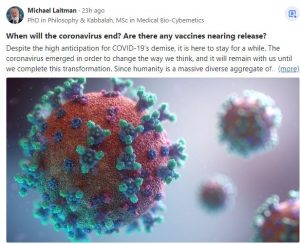
Despite the high anticipation for COVID-19’s demise, it is here to stay for a while.
The coronavirus emerged in order to change the way we think, and it will remain with us until we complete this transformation.
Since humanity is a massive diverse aggregate of different people, it will take some time for us to adapt to a much more interdependent world than what we were accustomed to in pre-coronavirus times.
Similar to how people get used to living with chronic diseases, so too we as a humanity will get used to the coronavirus.
It will simply become an integral part of our lives.
As any onset of a disease is felt severely as a shock to the body’s systems, likewise we are currently undergoing the initial pangs of the coronavirus’ “injection” into humanity.
However, this transition phase will settle and human society will assume a new, more independent form.
Even much of the engagement that the coronavirus has brought upon us has acted to exemplify our dependence on each other, i.e., how we depend on each other to wear masks, keep good personal hygiene, maintain our distance from each other and quarantine ourselves if we knowingly contact people with the virus.
We thus see how a small virus has helped us start seeing a more connected world, which operates on everyone and where everyone holds mutual influence, and it will continue to “teach” us such wisdom the more it stays with us.
We would thus be wise to internalize how we are all parts of a single system that is developing toward a new state of balance with nature.
That is, as nature is interdependent and interconnected, so we also discover more and more of nature’s and our own interconnectedness the more we develop.
Also, the more this process of increasing interdependence reveals itself to us, the more we will find ourselves at new sets of crossroads, stage after stage: We either agree to our increasing interdependence and accept more responsibility and consideration for each other, or we oppose it, and thus feel our tightening connection as an increasingly ugly and painful situation.
However, either way, nature presses us to connect more and more, like a steamroller of evolution that flattens our egoistic and harmful attitudes to each other. It squashes our egos like a lemon skin against a lemon squeezer, and will continue doing so until all of our egoistic juices become extracted.
At that stage, we will find a new kind of fulfillment in such qualities that currently seem less important or even ugly to us, like kindness, altruism, giving and consideration of others.
If only we could see that there is a very clear line from our current reality to a new, unified and perfect one, that nature has a state of perfection in store for us and carefully guides us there, then we would encounter everything in our lives more confidently, with a sense of purpose.
Now, we are divided in our attitudes to each other, and more than anything else, this division causes all of our pains. Our division is expressed as each of us being primarily concerned with self-benefit over benefiting others, which is opposite to nature’s holistic characteristic. Suffering is the differential we feel between our state and nature’s, and it operates on us to make us connect.
The more we make strides to connect with each other, the more balanced we will become with nature, and we will thus experience an inversion of our pains and sorrows to pleasures and joy.
We need only agree to connect above our divisive drives that constantly pull in the other direction, and when we reach such an agreement, we will likewise experience its benefits.
Thus, viewing humanity as a single organism and nature as its superior, we can see how nature vaccinated humanity with the coronavirus in order to heal us from our divisive attitudes to each other.
We can thus expect to exit the coronavirus pandemic as a stronger humanity, with healthier attitudes dwelling within, among peoples and nations. Therefore, while we are forced to keep our distance from each other, while doing so, we would be wise to think how we can become more internally connected.
What, then, would it take for the coronavirus to end?
By understanding that it is much more than a mere physical disease, but that it has come to bring upon a change to our thinking—from divided to connected, egoistic to altruistic, and individualistic to interdependent—then by adjusting our attitudes accordingly, we would truly put a stop to the pandemic, since nature would no longer need to use it to teach us a lesson.
Therefore, we should look out for each other, consider how we can prevent viruses of any kind to pass to others, from physical diseases to any kinds of harmful thoughts, and by exercising this mutual responsibility and consideration, the coronavirus will disappear from our lives.
Featured in Quora